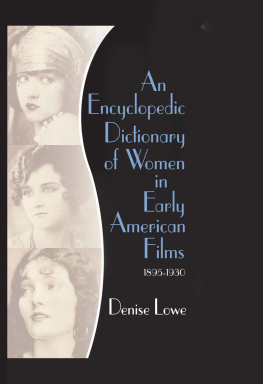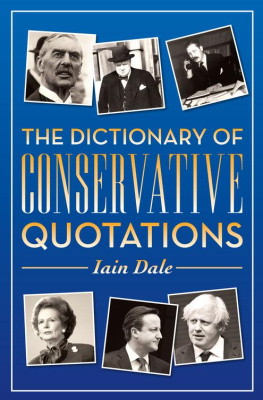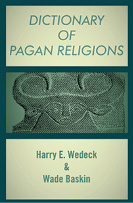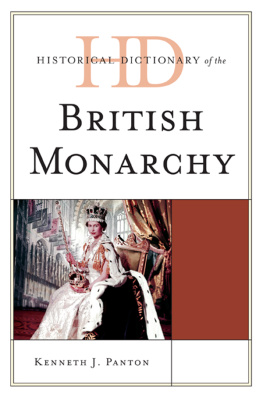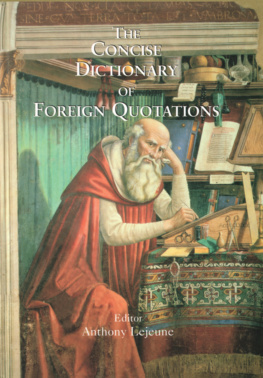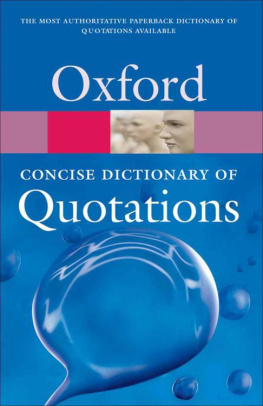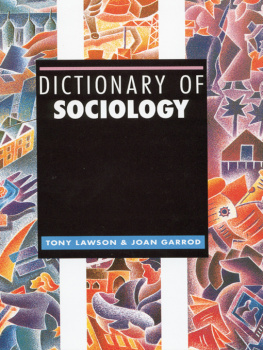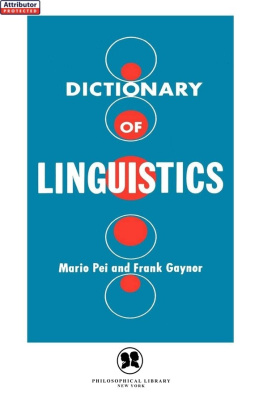WHAT GREAT MEN HAVE SAID ABOUT GREAT MEN
A Dictionary of Quotations
WILLIAM WALE

This 2011 edition published by Barnes & Noble, Inc.
All rights reserved. No part of this publication may be reproduced, stored in a retrieval system, or transmitted, in any form or by any means, electronic, mechanical, photocopying, recording, or otherwise, without prior written permission from the publisher.
Barnes & Noble, Inc.
122 Fifth Avenue
New York, NY 10011
ISBN: 978-1-4114-5726-3
P ETER A BELARD .
French Scholastic Philosopher: 10791142.
The most eminent and the most orthodox Doctor of the eleventh century.F. D. M AURICE , Medival Philosophy.
Abelard was almost the first who awakened mankind in the ages of darkness to a sympathy with intellectual excellence.... Abelard was the first of recorded name, who taught the banks of the Seine to resound a tale of love; and it was of Eloise that he sang.H ALLAM , Student's Middle Ages.
In the twelfth century was there any mind which shone more brightly, was there any eloquence which flowed more mightily, than that of Peter Abelard? Yet Abelard sank beneath the meanest of his scholastic contemporaries in the degradation of his career as much as he towered above the highest of them in the grandeur of his genius.F. W. F ARRAR , Seekers after God.
J OSEPH A DDISON .
English Essayist and Dramatist: 16721719.
Thus Addison, by lords carest,
Was left in foreign lands distrest.
S WIFT , A Libel.
On Addison's sweet lays attention waits
And silence guards the place while he repeats;
His Muse alike on every subject charms,
Whether he paints the God of Love, or Arms.
G AY , Epistle XIV.
No whiter page than Addison remains.
P OPE , Satires, etc., of Horace imitated.
With graceful steps see Addison advance
The sweetest child of Attic elegance.
T HOMAS W ARTON , The Triumph of Isis.
If Addison, or Rowe, or Prior write,
We study them with profit and delight.
C ONGREVE , Of Pleasing.
Guilt's chief foe in Addison is dead.
Y OUNG , Satire I.
Our age demands correctness; Addison
And you this commendable hurt have done.
Y OUNG , Epistle II.
Urge on my soul, with no ignoble pride,
To woo the Muse, whom Addison enjoy'd,
See that bold swain to heaven sublimely soar,
Pursue at distance, and his steps adore.
T ICKELL , Poem to the Lord Privy Seal.
Every Muse was fond of Addison.
Id., Oxford: a Poem.
Where Addison and Tickell lay inspir'd,
Inebriated, from the classic springs,
And tun'd to various-sounding harps the song,
Sublime or tender, humorous or grave,
Quaffing the Muses' nectar to their fill.
T HOMSON , Progress of Sickness.
In front of those came Addison. In him
Humour in holiday and sightly trim,
Sublimity and Attic taste combined,
To polish, furnish, and delight the mind.
C OWPER , Table Talk.
Every true criticfrom the Stagyrite
To Schlegel and to Addisonhath won
His fame by serving a reflected light,
And clearing vapour from a clouded sun.
L YTTON , The True Critic.
Whoever wishes to attain an English style, familiar, but not coarse, and elegant, but not ostentatious, must give his days and nights to the volumes of Addison.D R . J OHNSON , Lives of the Poets: Addison.
The exquisite taste and fine observation of Addison.L ORD J EFFREY , Essays.
It is the extremely moral and didactic tone of the Spectator which makes us apt to think of Addison (according to Mandeville's sarcasm) as "a parson in a tie-wig".H AZLITT , Lectures on the English Comic Writers.
No praise of Addison's style can exaggerate its merits. Its art is perfectly marvellous. No change of time can render the workmanship obsolete. His style has that nameless urbanity in which we recognise the perfection of mannercourteous, but not courtier-like; so dignified, yet so kindly; so easy, yet so high-bred. Its form of English is fixeda safe and eternal model, of which all imitation pleasesto which all approach is scholarshiplike the Latin of the Augustan age.L YTTON , Miscellaneous Prose Works, Vol. III.
Joseph was of a cold nature, and needed perhaps the fire of wine to warm his blood. If he was a parson, he wore a tye-wig, recollect. A better and more Christian man scarcely ever breathed than Joseph Addison. If he had not that little weakness for winewhy, we could scarcely have found a fault with him, and could not have liked him as we do.... He was a man's man, remember. The only woman he did know, he didn't write about. I take it there would not have been much humour in that story.... Is the glory of heaven to be sung only by gentlemen in black coats? Must the truth be only expounded in gown and surplice, and out of those two vestments can nobody preach it? Commend me to this dear preacher without ordersthis parson in the tye-wig. When this man looks from the world, whose weaknesses he describes so benevolently, up to the Heaven which shines over us all, I can hardly fancy a human face lighted up with a more serene rapture: a human intellect thrilling with a purer love and adoration than Joseph Addison's.T HACKERAY , English Humorists.
To Addison himself we are bound by a sentiment as much like affection as any sentiment can be which is inspired by one who has been sleeping a hundred and twenty years in Westminster Abbey.... It is praise enough to say of a writer that, in a high department of literature, in which many eminent writers have distinguished themselves, he has had no equal; and this may with strict justice be said of Addison.... If we wish to find anything more vivid than Addison's best portraits, we must go either to Shakespeare or to Cervantes.... That which chiefly distinguishes Addison from Swift, from Voltaire, from almost all the other great masters of ridicule, is the grace, the nobleness, the moral purity, which we find even in his merriment.M ACAULAY , Essays: Addison.
Addison is as true as Truth itself.R USKIN , Fors Clavigera.
In Addison we discern the amenity and ideal grace of Raphael.J AMES F ERGUSON .
In every thousand of those who have been delighted with the papers of Addison, perhaps not more than one has seen the Principia of Newton.D R . V ICESIMUS K NOX , Essays: on Essay Writing.
To estimate Addison at his real value we must regard him as the chief Architect of Public Opinion in the eighteenth century.... The work of Addison consisted in building up a public opinion which, in spite of its durable solidity, seems, like the great Gothic cathedrals, to absorb into itself the individuality of the architect. A vigorous effort of thought is required to perceive how strong this individuality must have been.W. J. C OURTHOPE , Addison.
SCHYLUS .
Greek Tragic Poet: B.C. 525456.
Brave schylus and Sophocles, around
Whose sacred brows the tragic ivy twin'd.
R ICHARD G LOVER , London.
But, do you see my friend, that thus
You leave Saint Paul for schylus?
Who made his Titan's arch-device
The giving men blind hopes to spice
The meal of life with.
R OBERT B ROWNING , Christmas Eve and Easter Day.
Are schylus and Sophocles and Euripides dead? No; the wondrous three are still in constellation. Bright are they as when they first shone, thousands of years ago, in the heavenly sky. But which are they? In what quarter of the region hang their golden lamps? Yonder. You see the glorious gems, enclosing as in a triangle a deep blue portion of stainless ether. The apex-star is schylusto the east is Sophoclesto the west, Euripides!J OHN W ILSON ,


